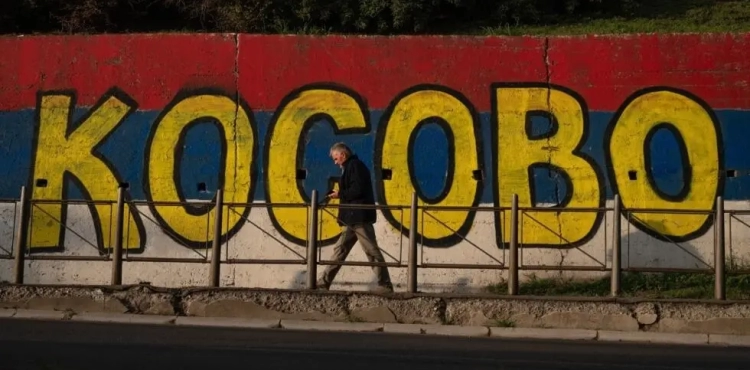After a warning from Washington, Serbia announced on Monday that it had “restored to normal” the level of its forces along the border with Kosovo, which it accused of planning to “annex” territory belonging to it in the north, a week after renewed violence.
The United States, Kosovo's main international ally, warned on Friday of a "large Serbian military deployment along the border with Kosovo," calling on Serbia to "withdraw its forces."
For its part, NATO announced on Sunday that its military mission in Kosovo, which includes 4,500 soldiers, will be reinforced by 600 British soldiers, 400 of whom are on the ground as part of training.
In the face of these pressures, Serbian Army Chief of Staff Milan Mojcilovic was keen on Monday to reassure Belgrade's intentions.
The Serbian general said in a statement to reporters in Belgrade that "the system of work of units... in the security zone" along "the administrative line with Kosovo has been restored to normal."
He added, "This means that the number of units in this security zone is normal," explaining that the number of soldiers was reduced from 8,350 to 4,500, a week after the recent violence in northern Kosovo.
Serbian leaders, who do not recognize the independence of the former Albanian-majority region in 2008, describe the border with Kosovo as an "administrative line."
During the latest violence on September 24, a group of fighters shot a Kosovo Albanian policeman and wounded another at a checkpoint near the village of Banska in northern Kosovo, where Serbs constitute a majority.
The Kosovo police then launched a large-scale operation against this group, which took refuge in a monastery belonging to the Serbian Orthodox Church. Three of its members were killed and three others were arrested. The rest fled, including Milan Radošić, who announced in Belgrade through his lawyer that he had organized and prepared the group without Belgrade's knowledge.
It is the most dangerous escalation in northern Kosovo, which has recently been rocked by repeated incidents.
-Preference for peace-
On Monday, the Serbian Chief of Staff said that he was "surprised by the great concern expressed by some" regarding the deployment of Serbian forces during the recent "security crisis."
He explained that the Serbian army deployed 14,000 soldiers in the same area in December 2022 and May 2023, during “similar security crises,” pointing out that the Serbian forces were placed on “the highest level of alert” that day, something that did not happen last week. .
For his part, Serbian Defense Minister Miloš Vucevic denounced an "irresponsible campaign" against the Serbian army and its deployment, but he also hinted that Serbian forces were capable of invading Kovoso if Serbian President Aleksandar Vucic ordered it to do so.
He said, "If the Serbian Army receives such an order from the President of Serbia, who is its Supreme Commander, for its units to enter the territory of Kosovo, as an integral part of Serbia, the Serbian Army will carry out this mission in an effective, professional and successful manner."
Earlier Monday, Kosovo Prime Minister Albin Kurti accused Serbia of intending to "annex" northern Kosovo, which is inhabited by a Serb majority.
“Based on the seized documents, Kosovo police confirmed that the terrorist attack (in Banska) was part of a larger plan to annex northern Kosovo through a coordinated attack on 37 sites,” Kurti wrote on the X platform.
According to him, the plan stipulated “establishing a corridor to Serbia to secure supplies of various equipment.”
A third of Kosovo's Serbs, numbering about 120,000 (1.8 million people), live in this region bordering Serbia, where Pristina wants to extend its sovereignty.
With the support of Belgrade, they refuse to declare their loyalty to the government of Kosovo, a former Serbian province with an Albanian majority that declared its independence in 2008, but which Serbia has never recognized.
On the same day of the attack, the Pristina authorities announced that Belgrade was behind this heavily armed group, accusations rejected by the Serbian authorities.












